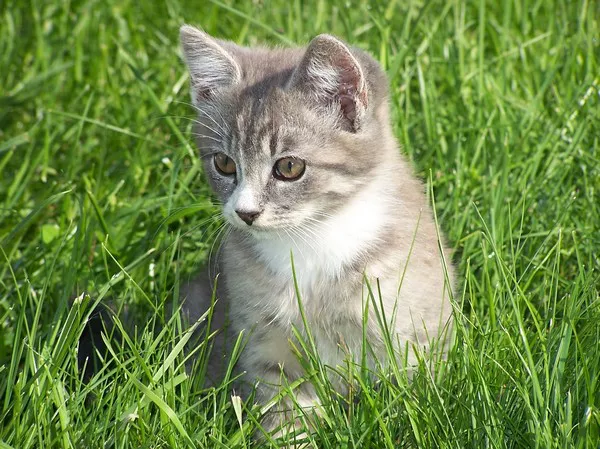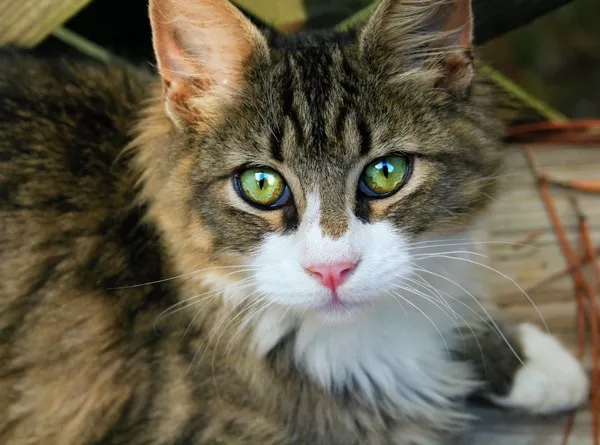The veterinary field is experiencing a major shift with the introduction of AI technology, unlocking new opportunities for proactive and data-driven cat care. A standout innovation in this transformation is AI-powered wearables, designed specifically for cats. These devices offer real-time health data, providing deeper insights into a cat‘s well-being and enabling early detection of health issues. As a pioneer in this space, wearables like Moggie— which sends real-time updates to users’ phones— bridge the gap between veterinarians and cat caregivers, improving health outcomes and fostering a stronger human-animal bond.
Cats are both predators and prey, and their instincts to conceal pain or discomfort are deeply ingrained. While this trait helps them survive in the wild, it complicates the detection of illness in domestic settings. Studies reveal that up to 80% of feline illnesses first manifest as subtle behavioral changes before physical symptoms are visible. These changes may include decreased activity, altered eating habits, or increased vocalization. Unfortunately, many caregivers overlook these early signs, leading to delayed diagnoses and missed chances for early intervention.
Additionally, 33% of cats fail to return for follow-up visits to their vet after an initial check-up, contributing to a lack of regular health monitoring. These challenges underscore the need for solutions that enhance feline healthcare and increase medical attention.
AI technology is changing how we track feline health. Wearables like Moggie continuously monitor vital behaviors—activity, sleep, eating, grooming, and litter box use—providing real-time insights into a cat’s health. Collecting up to 6 million data points each week, these devices enable caregivers to spot potential health issues before they become obvious.
For instance, decreased activity could suggest joint pain or early signs of osteoarthritis, while changes in eating or drinking patterns might point to gastrointestinal or dental issues. Even shifts in litter box behavior can indicate urinary tract infections or kidney problems. By detecting these subtle shifts, wearables allow caregivers to take proactive steps, improving health outcomes through early intervention.
Today’s cat caregivers are more informed, proactive, and invested in their pets’ health than ever before. Wearables provide actionable data that helps them better understand their cat’s health, enabling them to work closely with their veterinary team. With the ability to track key behavioral trends, caregivers can engage in more meaningful discussions with veterinarians, leading to improved care plans, diagnostics, and treatments.
By aligning insights with a vet’s care recommendations, wearables give caregivers the confidence to take action, ensuring more effective follow-through. This creates a stronger, collaborative partnership between veterinarians and caregivers, leading to better care for the cat.
AI-powered activity tracking offers veterinarians new ways to elevate their care. With access to real-time data, vets can detect health issues earlier, enabling more efficient interventions and improving health outcomes. This proactive approach not only enhances the medical care cats receive but also strengthens the relationship between veterinarians and their clients.
Wearables improve a vet’s decision-making by providing a wealth of behavioral metrics. This data-driven method helps streamline diagnoses and treatment plans, ensuring they’re tailored to the insights provided by the cat’s behavior. By focusing on these behavioral patterns, veterinarians can deliver more precise and proactive care, improving the overall quality of feline healthcare.
As veterinary care evolves toward a more predictive and personalized approach, AI-powered wearables will remain central to managing feline health. Devices like Moggie provide an unprecedented level of precision in monitoring cats’ behaviors, allowing for earlier identification of health concerns. Beyond detecting current issues, these technologies also have the potential to predict future health risks, offering a level of foresight previously unavailable in feline medicine.
As wearables continue to play a key role in the future of feline health, they empower both veterinarians and caregivers to manage feline care more effectively. This partnership strengthens the bond between humans and their feline companions, ensuring healthier, longer lives for cats through data-driven care.
AI-powered wearables like Moggie are setting a new standard in feline healthcare, offering real-time data and insights that give cats a voice, improving early disease detection, and fostering stronger caregiver-veterinarian relationships. By offering a proactive approach to managing feline health, this technology is revolutionizing how we care for our emotionally aware companions, helping to ensure longer, healthier lives for cats.
Related Topics



























